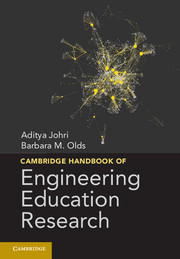Book contents
- Frontmatter
- Dedication
- Contents
- Editors
- Contributors
- Foreword
- Acknowledgments
- Introduction
- Chapter 1 Chronological and Ontological Development of Engineering Education as a Field of Scientific Inquiry
- Part 1 Engineering Thinking and Knowing
- Part 2 Engineering Learning Mechanisms and Approaches
- Part 3 Pathways into Diversity and Inclusiveness
- Part 4 Engineering Education and Institutional Practices
- Part 5 Research Methods and Assessment
- Part 6 Cross-Cutting Issues and Perspectives
- Index
Introduction
Published online by Cambridge University Press: 05 February 2015
- Frontmatter
- Dedication
- Contents
- Editors
- Contributors
- Foreword
- Acknowledgments
- Introduction
- Chapter 1 Chronological and Ontological Development of Engineering Education as a Field of Scientific Inquiry
- Part 1 Engineering Thinking and Knowing
- Part 2 Engineering Learning Mechanisms and Approaches
- Part 3 Pathways into Diversity and Inclusiveness
- Part 4 Engineering Education and Institutional Practices
- Part 5 Research Methods and Assessment
- Part 6 Cross-Cutting Issues and Perspectives
- Index
Summary
The Cambridge Handbook of Engineering Education Research (CHEER) is an important reference source for the growing field of engineering education research (EER). EER has become an increasingly important field internationally, as evidenced by the growing prestige and subscriber base of its key journal, the Journal of Engineering Education (JEE), the founding of several Ph.D.-granting engineering education departments at prestigious institutions, and the growth of an international community of engineering education researchers who hold global meetings and have a variety of publication venues. Despite the growth of the field, there is currently no book that provides an overview of EER. Thus we proposed CHEER with the belief that it will fill an important gap internationally in the EER field and will be used as a textbook for graduate courses, a reference book by engineering faculty in disciplinary engineering areas, and a resource by policymakers, K–12 engineering curriculum designers, informal science educators, and others.
Engineering education research draws on many social science disciplines in addition to disciplinary engineering knowledge and computing. Research in engineering education has traditionally focused on reporting of classroom interventions and generally lacked definition as a discipline until the late1990s and early 2000s. Since a landmark issue of JEE in 2005, which included papers by senior scholars in the field who argued for a stronger theoretical and empirically driven agenda for the field, engineering education has quickly emerged as a research driven field and subsequently has seen a substantial increase in both the quality and quantity of theoretical and empirical work. Research in engineering education is focused primarily on formal settings but work on informal learning in settings such as museums and after school programs is starting to appear. Chapters in this volume draw extensively on contemporary research in the learning sciences to include how technology affects learners and learning environments, and the role of social context in learning.
- Type
- Chapter
- Information
- Publisher: Cambridge University PressPrint publication year: 2014
- 1
- Cited by



